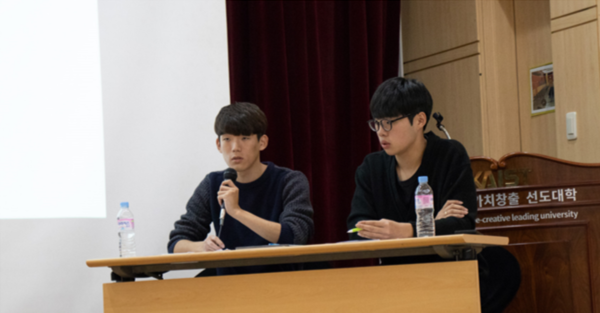On December 6, the Central Elections Committee (CEC) announced the results for the 33rd KAIST Undergraduate Association (UA) Election. With a 50.80% turnout, the election was in favor of FLEX, the sole presidential candidate team, with 1,958 votes (82.38%). Hyun-Sik Yoon, a senior in the School of Computing, will become President of the new KAIST UA. KyuWon Park, a sophomore in the Department of Chemistry, will be Vice President. Presidential elections for most departments were also held. However, votes for the Department of Physics, the Department of Chemical and Biomolecular Engineering, the School of Electrical Engineering, and the School of Computing have failed due to low turnouts.
Stakes are high for the two, as FLEX is now the first student-elected KAIST UA after two and a half semesters of vacant undergraduate leadership. Because the Emergency Response Committee (ERC), Link (I-Eum), which has been in operation for one year, was not voted for by the student body, it lacked the legitimacy to negotiate with the KAIST administration on various agendas. However, this lack of action is now expected to change with FLEX’s victory.

FLEX’s Agenda in Detail
FLEX has detailed its plans in its manifesto released in the last week of November. The 34-page document laid out what the candidates hope to achieve during their term in office. Yoon and Park also explained their agendas and stances in detail during the candidate debate hosted by the CEC on November 28, attended by Youngil Ko from The KAIST Herald, and Juyeon Shim and Heechan Lee from KAIST Times.
“Previous ERCs ran smoothly thanks to many KAISTians volunteering to work for the school,” commented Yoon, prior to specific questions on each agenda. “However, it inevitably lacked the drive necessary to get things done for the students.”
Park added that FLEX’s priority is to rebuild the trust and faith among students towards the KAIST UA. “To do so, we aim to solve problems closely connected with our well-being so that all of us can feel the positive changes in campus.”
Hence, the duo focused on enhancing general welfare for the undergraduate students in KAIST. They promised many improvements such as better WiFi connection, increased number of shuttle bus to different parts of the city, intercity bus passing through the school, a reversed OLEV route, limiting visitor access to KAIST during peak seasons, and re-allowing motorcycle delivery inside campus. When questioned on the viability of these pledges, Yoon underscored the importance of joint efforts from the UA and students. “The causes of the problem [of slow internet connection] and the overwhelming demands of KAISTians wanting to solve the problem will be analyzed,” he remarked when asked about how FLEX will tackle the WiFi crisis. “With tangible and documented opinions of the general student body, we will keep urging the school to change things in our favor.” The candidates explained that FLEX will do its best to represent the undergraduates as a full-time, student-voted executive body to bring about the necessary changes, something that ERC failed to do.
FLEX and Internationals
FLEX remarked that the newly changed Korean language graduation requirement for international students (See Volume 172 for more information) epitomizes the lack of international student representation on campus. As such, it has put forth various plans to protect the rights of internationals.
Firstly, Yoon promised prompt responses to violations of international students’ academic rights. For example, in cases where important notices are posted only in Korean on KLMS, the KAIST UA will intervene and request the professors to abide by the “English-only” policy in lectures.
Secondly, FLEX pledged to improve English translation for internationals by revising the current system to reduce the number of “[to be translated]” posts. Yoon promised a gradual strengthening of the Communication Globalization Committee’s supervision of translations of notices from organizations and events such as academic departments, KAIST’s annual job fair, and lecture reviews on the OTL website.
Finally, to mitigate the political underrepresentation of international students in KAIST, FLEX has plans to hold official regular meetings with KISA. After a failed attempt of a KAIST UA-KISA merger back in October 2017, (See Volume 157 for more information), interactions between the two organizations were minimal. When asked about the possibility of a second merger attempt, Yoon took a cautious approach. “The question of having KISA as one of the special organizations under the UA is difficult. We first need to hear what KISA has to say.”
During an interview with The KAIST Herald, vice-president-elect KyuWon Park emphasized his determination to help the internationals. “International students should not have their rights violated just because there are less of them in KAIST. FLEX will not stop until every voice from the international community are heard.”
Behind the Scenes
The KAIST UA Election Regulation stipulates that a vote turnout of 50% or more is needed for the ballot count. This election just barely reached the minimum requirement during the final minutes of the vote on December 6, with a final voter turnout of just 50.80%. Some of the department representative elections that ran alongside the 33rd KAIST UA Election failed to meet the turnout threshold. The Department of Physics, the Department of Chemical and Biomolecular Engineering, the School of Electrical Engineering, and the School of Computing had voter turnouts of 42.86%, 43.81%, 47.54%, and 46.74% respectively, and as it currently stands will not have department presidents in 2020.
Students were very active on KaDaeJeon during and after the event. While some condemned those deliberately abstaining from voting as the cause of student society failing, others defended the choice of inaction as another form of expression of opinion towards the candidates. Thoughts that the KAIST UA only turns to international students when it needs help also spread amongst internationals after an anonymous post on Here at KAIST, an English equivalent of KaDaeJeon. The indifference and segregation amongst KAISTians are undeniable, and FLEX has a long and difficult road ahead to regain students’ trust and support for the KAIST UA.

